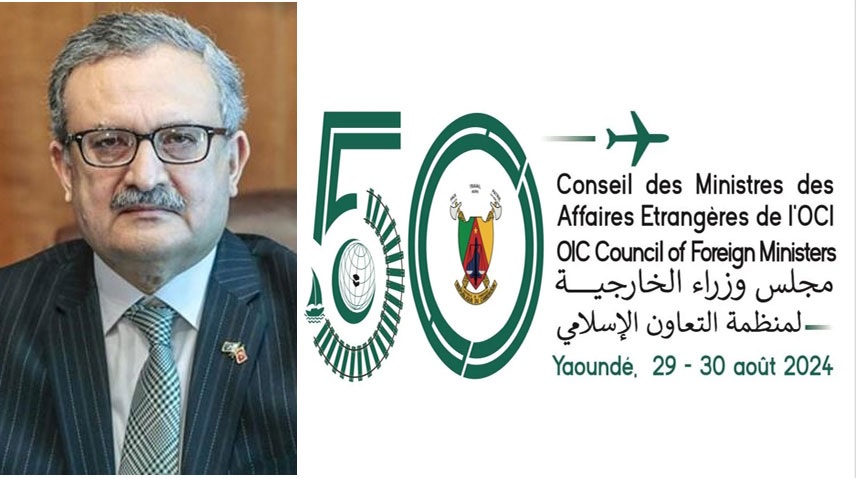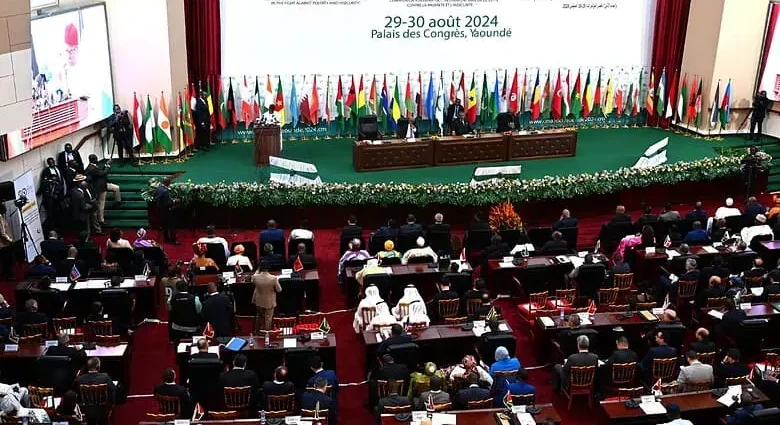Kashmir dispute must be resolved to ensure durable peace in South Asia: Muhammad Syrus Sajjad Qazi
“Indian Illegally Occupied Jammu and Kashmir (IIOJK) remains one of the most heavily militarized zones in the world,
Says over 40,000 Palestinians have been martyred & nearly two million displaced by Israel’s genocidal war in Gaza
Unfortunately, we continue to face externally financed, sponsored and supported terrorism from across our borders.
Action to neutralize all terrorist groups within Afghanistan – ISIL-K (Daesh), the TTP, and others such as the ETIM, IMU and the TTT.”
YAOUNDÉ ( WEB NEWS )
Foreign Secretary Muhammad Syrus Sajjad Qazi has said that the Kashmir dispute must be resolved to ensure durable peace in South Asia. Foreign Secretary said that our brethren in Palestine as well as Jammu & Kashmir endure oppressive foreign occupation and denial of their fundamental right to self-determination. He said that over 40,000 Palestinians, the majority of them women and children, have been martyred and nearly two million displaced by Israel’s genocidal war in Gaza.”

This was stated by Foreign Secretary Muhammad Syrus Sajjad Qazi at the 50th Session of the OIC CFM, Yaoundé, Cameroon. Foreign Secretary expressed sincere appreciation to Hissein Brahim Taha, the Secretary-General of the OIC and his team for the outstanding work in advancing the OIC’s objectives and for the meticulous preparations for the 50th OIC- CFM
He said, “I extend my heartfelt gratitude to Lejeune Mbella Mbella, Minister of External Relations of the Republic of Cameroon, and to the Government of Cameroon, for their warm welcome and outstanding hospitality in this vibrant city of Yaoundé. My heartfelt felicitations on assuming the chairmanship of the 50th Session of the OIC – Council of Foreign Ministers. Let me also express our highest appreciation to the Government of Mauritania for hosting the last CFM and for their leadership during the past year.”
He said, “Pakistan expresses sincere appreciation to, Hissein Brahim Taha, the Secretary-General of the OIC and his team for the outstanding work in advancing the OIC’s objectives and for the meticulous preparations for the 50th OIC- CFM. As we convene for the 50th OIC Council of Foreign Ministers, the Muslim Ummah stands at a pivotal crossroads in its history.”
He said, “Our brethren in Palestine as well as Jammu & Kashmir endure oppressive foreign occupation and denial of their fundamental right to self-determination. Conflicts rage across the world, including the Muslim world, fueled by endemic poverty, terrorist and extremist groups and external interventions. Rising Islamophobia subjects our nations and Muslims everywhere to discrimination, violence and aggression. Our challenges are being compounded by surging great power rivalries, global economic stagnation, impact of climate change as well as the deficits in international solidarity and cooperation. At this crucial moment, we must respond with unity and resolve to address these multiple challenges confronting the Islamic Ummah.”
He further said, “The desecration of Holy Al-Aqsa led to the creation of the OIC. This Organization’s raison d’être dictates determined action to respond to Israel’s on- going brutal aggression against the Palestinian people and the depredations against Islam’s most sacred sites and symbols. Over 40,000 Palestinians, the majority of them women and children, have been martyred and nearly two million displaced by Israel’s genocidal war in Gaza.”
“The 15th Islamic Summit in Gambia and last month’s extraordinary OIC Executive Committee meeting in Saudi Arabia have adopted far-reaching decisions to respond to Israel’s brutal and ongoing aggression. At this CFM, we must develop a clear and bold plan to secure implementation of the goals and objectives agreed by our leaders,” he noted.
He said, “We must urgently secure an immediate and unconditional ceasefire in Gaza and the West Bank; ensure unrestricted humanitarian aid to Gaza; prevent the spread of the conflict to the entire Middle East, while holding Israel accountable for its criminal assassinations and violation of the sovereignty and territorial integrity of Iran, Lebanon and other States; admit Palestine as a full member State of the United Nations; and establish a viable, secure, contiguous, and sovereign State of Palestine based on pre-1967 borders, with Al-Quds Al-Sharif as its capital.”
“Jammu and Kashmir is also a common cause of OIC Member States. Like Palestine, the situation in Kashmir involves the violation of two vital principles of the UN Charter: one, the exercise of the right of self-determination; and two, non- acquisition of territory by the use of force. The Kashmir dispute must be resolved to ensure durable peace in South Asia. India has resiled from its commitments to implement the Security Council resolutions prescribing a plebiscite to enable the people of Jammu and Kashmir to determine the final disposition of the territory. Since 5 August 2019, India initiated unilateral steps to annex occupied Jammu and Kashmir and impose what India’s leaders ominously call a “Final Situation” for Kashmir,” he added.
“Indian Illegally Occupied Jammu and Kashmir (IIOJK) remains one of the most heavily militarized zones in the world, where the Indian occupation forces continue to impose draconian measures including extra-judicial killings, collective punishments, incarceration of Kashmiri leaders as well as demographic changes to transform Kashmir from a Muslim-majority to a Hindu majority territory. Yet, the Kashmiri people have refused to be coerced into submission. Their valiant resistance to Indian occupation remains unwavering. They continue to demand their fundamental rights, including the right to self-determination,” he remarked.
He stressed, “India must reverse the unilateral measures taken since 5 August 2019 to create conducive conditions for dialogue to peacefully resolve the Kashmir dispute. Pakistan also rejects all attempts to conduct any farcical “elections” in IIOJ&K. The Security Council has clearly delineated the principle that the final disposition of the State of Jammu and Kashmir will be made in accordance with the will of the people expressed through the democratic method of a free and impartial plebiscite conducted under the auspices of the United Nations. India should also accept the UN Secretary General’s offer of Good Offices.”
He noted, “Islamophobia has emerged as a global crisis, marked by frequent desecration of the Holy Quran, attacks on mosques, negative stereotyping of Muslims and acts of discrimination and violence against them. We can see one of the most alarming manifestations of Islamophobia in our own neighbourhood where violence against India’s 200 million Muslims, has become rampant, fueled by the “Hindutva” ideology. We must work within the OIC, including through the OIC Secretary General’s Special Envoy on Islamophobia, to reach out to the United Nations to develop an Action Plan to Combat Islamophobia. The scourge of terrorism has surged once again to threaten regional and global peace and security. All OIC countries and regions – the Maghrib, the Sahel, Afghanistan, Central, South or East Asia – confront the terrorist threat. We also confront far right, fascist ideologies, Hindutva and Islamophobic groups targeting Muslims.”
He said, “Pakistan is the biggest victim of terrorism. We have contributed the most to fight terrorism. Unfortunately, we continue to face externally financed, sponsored and supported terrorism from across our borders. The OIC must work collectively to combat all forms of terrorism, including by expanding the scope of the UN counter-terrorism framework and reforming its architecture, including the UN Security Council sanctions regimes, to eliminate all terrorist groups, including ISIL-K, Al Qaida and the TTP, as well as Islamophobic, supremacist, and far right groups and ideologies.”
He said, “Pakistan desires the earliest possible normalization of the situation in Afghanistan. The international community must provide sustained humanitarian assistance to the over 25 million destitute Afghans. At the same time, the Afghan Interim Government must respond to the concerns of the international community, including respect for human rights, including the rights of women and girls, political inclusivity and, in particular, action to neutralize all terrorist groups within Afghanistan and those responsible for cross- border terrorism against neighboring countries – ISIL-K (Daesh), the TTP, and others such as the ETIM, IMU and the TTT.”
He said, “Pakistan has a long and proud history of solidarity, friendship and cooperation with the nations of Africa. We will cooperate with them to counter terrorism. We will continue our seminal role in UN peacekeeping and peacebuilding in Africa. Pakistan believes the OIC can play a strong role in modernized Peacekeeping including in Africa. We support revitalizing the UN system to effectively address contemporary challenges, including a reformed UN Security Council. As declared by the recent OIC Summit, the Islamic Ummah must have adequate representation in any category in an expanded Security Council.”
Syrus Sajjad Qazi said, “The promotion of the interests of the Islamic Ummah is the cornerstone of Pakistan’s foreign policy. As a member of UN Security Council during the next two years, Pakistan will work actively to address the challenges of the Islamic World, including Jammu and Kashmir, Palestine and the Middle East, Afghanistan, the Sahel, Somalia and Libya and other issues. We look forward to your support and cooperation as Pakistan endeavors to address the common challenges and objectives of the Islamic world.”

